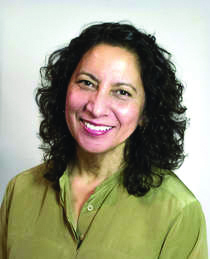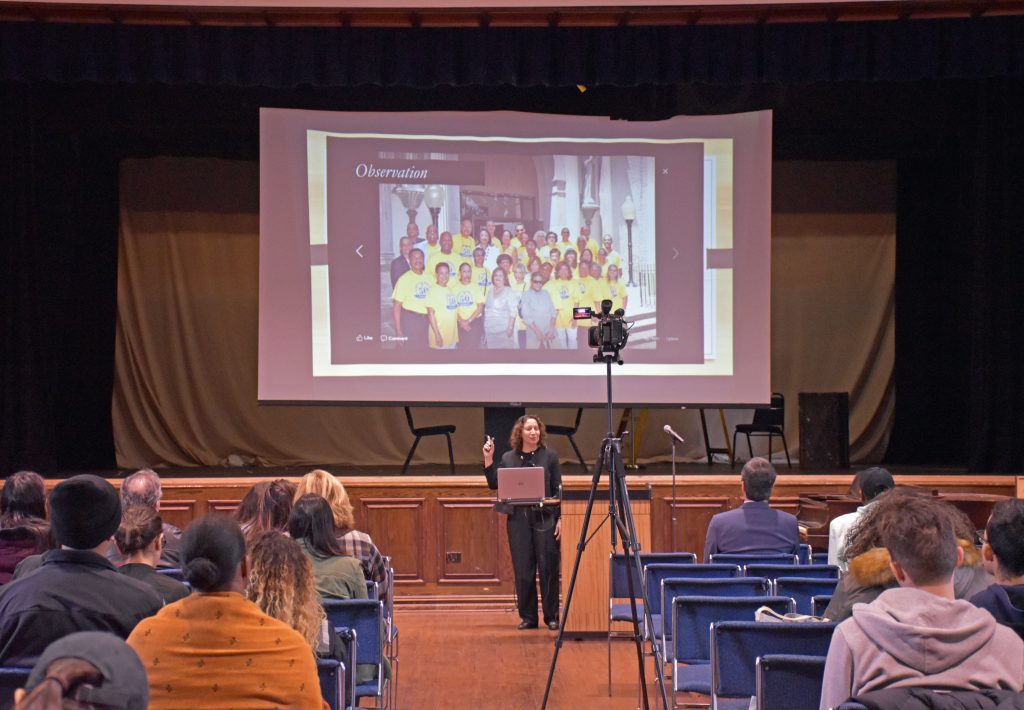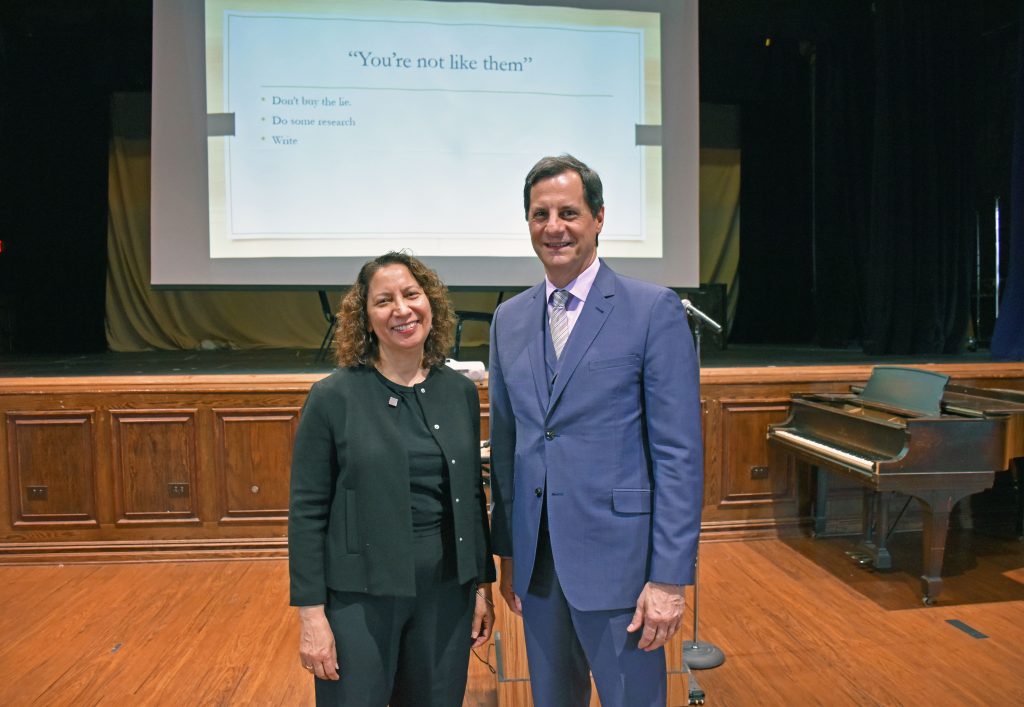 Fatima Shaik is an assistant professor in the communication and media culture department at Saint Peter’s University, and is a bene merenti recipient, meaning she has worked at the University for at least 20 years. She is a former reporter and her work has appeared in numerous publications including The New York Times and ESSENCE. Her short stories have appeared in The Southern Review, Callaloo and others. Awards include a National Endowment for the Humanities (NEH) Fellowship, Louisiana Endowment for the Humanities (LEH) grant and a Kittredge Fund grant. She grew up in the 4th ward of New Orleans and her work focuses on the Louisiana Creole and African-American experience.
Fatima Shaik is an assistant professor in the communication and media culture department at Saint Peter’s University, and is a bene merenti recipient, meaning she has worked at the University for at least 20 years. She is a former reporter and her work has appeared in numerous publications including The New York Times and ESSENCE. Her short stories have appeared in The Southern Review, Callaloo and others. Awards include a National Endowment for the Humanities (NEH) Fellowship, Louisiana Endowment for the Humanities (LEH) grant and a Kittredge Fund grant. She grew up in the 4th ward of New Orleans and her work focuses on the Louisiana Creole and African-American experience.
Q. Tell me a little about yourself
A. I lived in New Orleans my whole life and went to Xavier University of New Orleans. Then, I transferred to Boston University to be a writer where I studied journalism.
I came back to New Orleans and was a reporter and editor there. I wrote for a statewide paper and even did sports journalism for a while. There was only so much I could do in New Orleans because there was no Internet at the time. I decided to go to NYU for graduate school to work on my writing. I have wanted to write since I was a kid.
I took journalism classes there but I had been a journalist so I already knew a lot of what they were teaching. I decided to study something I knew nothing about, which was politics and international relations. I also took a class in art journalism with Grace Glueck from The New York Times.
From there, I worked for newspapers, magazines and McGraw-Hill World News. I freelanced for many publications including The New York Times, ESSENCE, BLACK ENTERPRISE and Working Woman magazine. I worked at McGraw-Hill for about 10 years and then went into academia.
Q. What influenced your decision to transition to academia?
A. Academia is wonderful if you want to be a writer. Academia is a good place because you have the summers off and your colleagues support what you do because they like to see you writing. I started in the English department at
Saint Peter’s. Then, I worked to put together the communication program with the help of others including Marylou Yam, Ph.D., former provost and vice president for academic affairs, John Walsh, Ph.D., and William Luhr, Ph.D., English professors.

Fatima Shaik Presenting “Black Absorbs All Colors”
Q. What topics do you like to write about? What is your style?
A. I write fiction and nonfiction. In some eras, fiction tells more of the truth or nonfiction tells more of the truth. To me, it makes more sense to write nonfiction right now. At the time of Katrina, when you tried to write about how floodwaters came to wipe out a whole city you would have to write nonfiction.
Q. You write a lot about New Orleans. Tell me about that.
A. I decided early on to focus on New Orleans. I had a wonderful upbringing there that was very visual. My parents encouraged me to observe, listen and take in phenomena when I was young. It is also a practical decision because it is easier for me to find metaphors about topics such as loss and sadness. New Orleans grounds me. It helps to write about a place that I know very well. One of my teachers told me, “You should always be away from a place to write about it well,” so, I was in New York and writing about New Orleans.
Q. Are there other themes that connect your writing?
A. My essential question has always been about race. I grew up in segregation but my family traveled a lot. We spent a lot of time in Canada. So, I wondered what are the differences among people? I am always trying to answer that question. There doesn’t seem to be any difference except for social considerations of race. People seem to be essentially the same to me. There seems to be no differences in human nature. That has given me a lot of material.
Q. What does your current research involve?
A. I have recently been investigating the melting pot of black America starting with New Orleans because it is an obvious melting pot. It has always been seen as having black or white people. I am exploring that concept and looking at the black people I know and saying we are not monolithic. We have always taken outliers into the black communities. I am thinking many of the stories about historical borrowings have not been told. I have also been doing research for my sixth book, which is coming out in 2019 from The Historic New Orleans Collection. It is a book that I have been working on for decades. It is nonfiction about the Economy Society, an organization of free men of color.

Fatima Shaik with Provost and Vice President for Academic Affairs, Fred Bonato, Ph.D.
Q. Talk a little about your involvement with PEN America.
A. I am on the PEN America Board of Trustees as a representative for the children’s and young adult book committee. PEN America is committed to free expression. Free expression is under siege right now. What I learned when I was 20 years old at the time of Watergate was how important it was for journalists to do their jobs. I am seeing it again now; people who speak out are being told to shut up or that they are enemies. That is dangerous talk. Everyone should be able to talk. Theoretically, we are founded on the position if everyone gets to talk that people are essentially good at heart. The good part is now we have social media. Social media balances out the democracy. Before we had three channels and that was all the news we knew but now we have millions of channels of information. As long as we keep the airwaves free, I think democracy will be saved.
Q. You suggested that other cultures should make themselves aware of each other. How do you recommend doing this?
A. Luckily, we have the Internet. Go to legitimate sites, for example, The Brown Bookshelf, theroot.com, or the Association for the Study of African American Life and History. Start with the Internet and subscribe to a site. Find a black magazine like ESSENCE or EBONY and read their stuff every once in a while. Follow one or two sources that are outside of your own culture. You will get a view of what other people think. I certainly don’t read just black news. We should all read widely.
Q. What accomplishment are you the most proud of?
A. I am proud of my children. One is a writer and one is a photographer. They both have their master’s degrees from Syracuse University. They are what I am the most proud of.
I am also proud of my stories after Katrina. Go to Inthesetimes.com and look up Fatima Shaik; I wrote about five stories. They are heartfelt and descriptive of what was going on. I am proud of them because I was able to use the power of narrative journalism to shed light on a real event.
